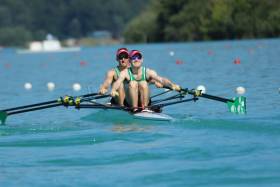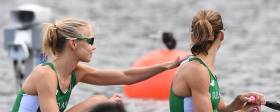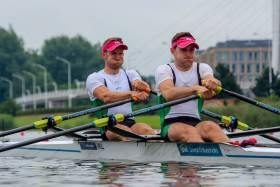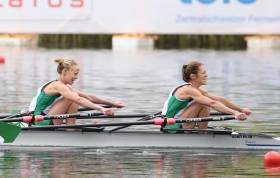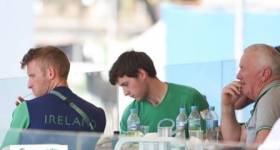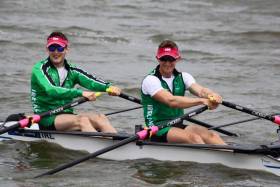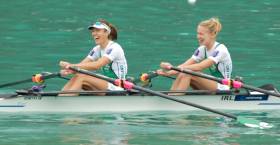Displaying items by tag: Olympic games
Irish Rowing Test in Rio Ends With Puspure's C Final Win
#Rowing: Sanita Puspure ended her Olympic programme in Rio de Janeiro with a win. The Ireland single sculler won the C Final, placing 13th overall. She had been very disappointed not to at least make the B Final, but she won this race well. Puspure got an early lead and held it, with Lina Saltyte of Lithuania the only competitor who kept pace with her until the closing stages.
Olympic Games Regatta, Rio de Janeiro (Irish interest; selected results)
Women
Single Sculls - C Final (Places 13 to 18): 1 Ireland (S Puspure) 7:27.60, 2 Lithuania (L Saltyte) 7:30.38, 3 Sweden (A M Svennung) 7:32.54.
Puspure Extends Good Irish Rowing Run in Rio
#Rowing: Sanita Puspure won her C/D semi-final to progress to the C Final at the Olympic Games regatta in Rio de Janeiro today. The 34-year-old single sculler was in control through the key stages and won by over 12 seconds from Michelle Pearson from Bermuda.
Puspure was unfortunate to lose her chance of an A/B semi-final place when she was drawn in a very tough quarter-final. Kim Brennan and Duan Jingli, who finished ahead of the Ireland sculler in the quarter-final won the A/B semi-finals.
Silver For O'Donovan Brothers in Olympic Rowing Final
#Rowing: Paul and Gary O'Donovan won silver for Ireland at the Olympic Games in Rio de Janeiro today. The young men from Lisheen in Cork produced an outstanding finish, taking the middle place between France and Norway in a three-boat sprint to the line.
As is their way, the O'Donovans hung off the leading group through the early stages, but they were wise enough to not lose touch. By 1500 metres they were second behind eventual winners France. And then the O'Donovans went hunting for gold. France held out as both Ireland and Norway closed on them. Less than three-quarters of a second covered the three crews at the finish.
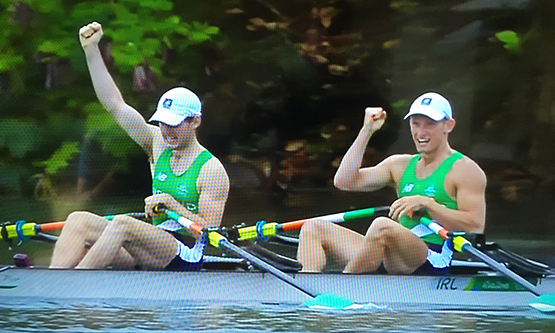 Olympic Silver Medal winners Paul and Gary O'Donovan celebrate Ireland's first ever Olympic rowing medal
Olympic Silver Medal winners Paul and Gary O'Donovan celebrate Ireland's first ever Olympic rowing medal
Olympic Games Regatta, Rio de Janeiro
Men
Lightweight Double Sculls - A Final: 1 France (P Houin, J Azou) 6:30.70, 2 Ireland (G O'Donovan, P O'Donovan) 6:31.23, 3 Norway 6:31.39. B Final (places 7 to 12): 1 Britain (W Fletcher, R Chambers) 6:28.81.
Single Sculls - Semi-Final (Three to A Final; rest to B Final):
4 Britain (A Campbell) 7:09.54.
Women
Lightweight Double Sculls - A Final:
Netherlands 7:04.73, 2 Canada 7:05.88, 3 China 7:06.49; 6 Ireland (C Lambe, S Lynch) 7:13.09.
Irish Women Sixth in Olympic Rowing Final
#Rowing: Sinead Lynch and Claire Lambe finished sixth in the Olympic final of the lightweight double sculls in Rio de Janeiro.
The Ireland crew needed to be strong in the middle 1,000 metres, but the race got beyond them, and they could not hold on to the leaders. The Netherlands won gold. They started well and were in the leading group of three with South Africa and the China. As they other two faded, the Netherlands pushed on and held off a challenge by Canada, who took silver, with China third.
Olympic Games Regatta, Rio de Janeiro
Men
Lightweight Double Sculls: B Final (places 7 to 12): 1 Britain (W Fletcher, R Chambers) 6:28.81.
Single Sculls - Semi-Final (Three to A Final; rest to B Final):
4 Britain (A Campbell) 7:09.54.
Women
Lightweight Double Sculls - A Final:
Netherlands 7:04.73, 2 Canada 7:05.88, 3 China 7:06.49; 6 Ireland (C Lambe, S Lynch) 7:13.09.
O'Donovans Secure Second Olympic Rowing Final Place for Ireland
#Rowing: Paul and Gary O'Donovan lifted Ireland into a second Olympic final at Rio de Janeiro today. The men from Lisheen near Skibbereen finished third in their semi-final of the lightweight double sculls. France and the United States set the early pace, with Britain third and Ireland in fourth. The O'Donovans took a marginal lead over Britain at half way and then hunted down the leaders. France held on to take first ahead of the United States, who had just over a half a second over Ireland.
South Africa won the second semi-final, pushing Norway in to second. Poland won a battle for third with Italy. The winning time - six minutes 38.01 seconds - was over three seconds slower than that in Ireland's semi-final.
Olympic Games, Rio de Janeiro (Irish interest; selected results)
Men
Lightweight Double Sculls - Semi-Finals (First Three to A Final; rest to B Final)
Semi-Final One: 1 France 6:34.43, 2 United States 6:35.19, Ireland (G O'Donovan, P O'Donovan) 6:35.70; 4 Britain 6:38.76, 5 Germany 6:59.28, 6 China 7:01.49.
Semi-Final Two: 1 South Africa 6:38.010, 2 Norway 6:38.65, 3 Poland 6:40.23.
Women
Lightweight Double Sculls - Semi-Finals (First Three to A Final; rest to B Final)
Semi-Final One: 1 South Africa 7:19.09, 2 New Zealand 7:19.27, 3 China 7:20.94.
Semi-Final Two: 1 Netherlands 7:13.93, 2 Canada 7:16.35, 3 Ireland (C Lambe, S Lynch) 7:18.24; 4 Denmark 7:20.29, 5 United States 7:22.78, 6 Germany 7:33.21.
Lynch and Lambe Give Ireland Place in Olympic Rowing Final
#Rowing: Sinead Lynch and Claire Lambe qualified for the Olympic Games A Final in Rio de Janeiro today. The Ireland lightweight double finished third behind the Netherlands and Canada, holding off Denmark in a very controlled and impressive performance.
In the first semi-final South Africa won from New Zealand, with China taking third.
Olympic Games, Rio de Janeiro (Irish interest; selected results)
Women
Lightweight Double Sculls - Semi-Finals (First Three to A Final; rest to B Final)
Semi-Final One: 1 South Africa 7:19.09, 2 New Zealand 7:19.27, 3 China 7:20.94.
Semi-Final Two: 1 Netherlands 7:13.93, 2 Canada 7:16.35, 3 Ireland (C Lambe, S Lynch) 7:18.24; 4 Denmark 7:20.29, 5 United States 7:22.78, 6 Germany 7:33.21.
Irish Crews Must Wait as Olympic Rowing Day Lost
#Rowing: Ireland crews at the Olympic Games in Rio de Janeiro must wait at least at day to compete, as racing has been cancelled for the day. The weather also forced the cancellation of the entire programme on Sunday. The Ireland lightweight double sculls of Sinéad Lynch and Claire Lambe and Paul and Gary O’Donovan were due to go into action in semi-finals at 1pm and 1.10pm Irish time. Single sculler Sanita Puspure was also due to compete in her C/D Semi-Final at 3.40pm.
So Close for Puspure in Tough Olympic Quarter-Final
#Rowing: Sanita Puspure just missed out on a semi-final place at the Olympic Games today. The 34-year-old was in a remarkably tough quarter-final, with World Champion Kimberley Brennan leading the others out and winning well. Seven-time Olympian Ekaterina Karsten tracked Brennan down the course, with Duan Jingli holding third. Puspure slipped into fourth and while she made a spirited challenge in the final stages, she just could not quite catch Karsten or the Chinese sculler.
Alan Campbell qualified for the men's single semi-finals. The Coleraine man, competing for Britain, finished second in his quarter-final. He was just under five seconds behind the winner, Damir Martin of Croatia.
Olympic Games Regatta, Rio de Janeiro (Irish interest; selected results)
Men
Single Sculls - Quarter-Final Four (First Three to A/B Semi-Finals; rest to C/D Semi-Finals): 2 Britain (A Campbell) 6:49.41.
Women
Single Sculls - Quarter-Finals - (First Three to A/B Semi-Finals; rest to C/D Semi-Finals):
Quarter-Final One: 1 New Zealand (E Twigg) 7:31.79, 2 Czech Republic (M Topinkova-Knapkova) 7:37.04, 3 Mexico (K Lechuga Alanis) 7:44.11.
Quarter-Final Two: 1 United States (G Stone) 7:27.04, 2 Switzerland (J Gmelin) 7:29.66, 3 Austria (M Lobnig) 7:35.37.
Quarter-Final Three: 1 Denmark (F Udby Erichsen) 7:33.24, 2 Zimbabwe (M Thornycroft) 7:34.00, 3 Canada (C Zeeman) 7:34.00.
Quarter-Final Four: 1 Australia (K Brennan) 7:26.86, 2 China (J Duan) 7:27.88, 3 Belarus (E Karsten) 7:28.03; 4 Ireland (S Puspure) 7:28.68, 5 Lithuania 7:38.39, 6 Argentina 7:56.61.
#Rowing: Ireland's Paul and Gary O'Donovan won their heat to qualify for the semi-finals of the Olympic Games in Rio de Janeiro. Italy had been seeded in fourth, one place ahead of the O'Donovans in the lightweight double sculls, and the Italians led until the final quarter. However, this was a race on the lines that the O'Donovans have made their own. They were a length down after 500 metres, but were disputing second with Germany by halfway. By 1500 metres the Irish had left Germany in fourth and, with Denmark pushing into third, Ireland dispurted the lead with Italy. Ireland then pushed on to win.
Olympic Games Regatta, Rio de Janeiro (Irish interest; selected results)
Men
Lightweight Double Sculls - Heat One (First Two to A/B Semi-Finals; rest to repechages): 1 Ireland (P O'Donovan, G O'Donovan) 6:23.72, 2 Italy 6:24.10; 3 Denmark 6:33.67, 4 Germany 6:40.48, 5 Turkey 6:41.67.
Women
Lightweight Double Sculls - Heats (First Two to A/B Semi-Finals; rest to repechages): Heat One: 1 China 7:00.13, 2 Denmark 7:01.84. Heat Two: 1 Netherlands 6:57.28, 2 New Zealand 7:02.01.
Heat Three: 1 South Africa 7:07.37, 2 Ireland (C Lambe, S Lynch) 7:10.91; 3 Brazil 7:20.79, 4 Cuba 7:26.43, 5 Tunisia 7:43.33.
Heat Four: 1 Canada 7:03.51, 2 Poland 7:05.02
Lynch and Lambe Cruise to Olympic Semi-Finals
#Rowing: Ireland's Sinead Lynch and Claire Lambe have qualified for the A/B Semi-Finals of the lightweight double sculls at the Olympic Games. The Ireland crew finished a comfortable second behind South Africa, the second seeds, who led down the course. Cuba and Brazil were the only threats to Lynch and Lambe, but were well behind at the end.
Britain's Kat Copeland and Charlotte Taylor finished fifth in the first heat.
Olympic Games Regatta, Rio de Janeiro (Irish interest; selected results)
Women
Lightweight Double Sculls - Heats (First Two to A/B Semi-Finals; rest to repechages): Heat One: 1 China 7:00.13, 2 Denmark 7:01.84. Heat Two: 1 Netherlands 6:57.28, 2 New Zealand 7:02.01.
Heat Three: 1 South Africa 7:07.37, 2 Ireland (C Lambe, S Lynch) 7:10.91; 3 Brazil 7:20.79, 4 Cuba 7:26.43, 5 Tunisia 7:43.33.
Heat Four: 1 Canada 7:03.51, 2 Poland 7:05.02


























